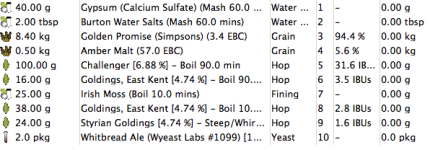Hi all,
I brewed a blonde ale last week in accordance to the Exmoor Gold credentials according to Graham Wheeler British Real Ale (3rd edition) brewing book.
The Exmoor Gold beer is supposed to be:
OG: 1045
Colour: 8 EBC
Bitterness: 40 EBU
I pumped the brew details into brewsmith 2 and the information for bitterness for a blonde ale is rated between 15-28 IBU.
Anyway I plunged for the book target of 40 and completed the brew. Everything came out on target (OG, colour, Bitt).
The brew has now completed its primary fermentation and is now ageing (well sat in the same primary FV) - However it is very bitter. Two other people have tasted and commented on the bitterness too so I am very nervous.
The beer is only 8 days old so may change - hopefully mellow out. Will this be the case?
Should I have ignored the recipe valve and worked with the beersmith 2 beer values for the given beer type? Will the bitterness subside? Can these books be trusted for accurate recipes?
I feel a bit deflated about this brew. I have done some great brews in the past and just used beer smith to work with. Now Ive tried a clone I feel another disastrous brew is looming.
Can anyone advise regards this brew, using beer smith and following book recipes.
Cheers
I brewed a blonde ale last week in accordance to the Exmoor Gold credentials according to Graham Wheeler British Real Ale (3rd edition) brewing book.
The Exmoor Gold beer is supposed to be:
OG: 1045
Colour: 8 EBC
Bitterness: 40 EBU
I pumped the brew details into brewsmith 2 and the information for bitterness for a blonde ale is rated between 15-28 IBU.
Anyway I plunged for the book target of 40 and completed the brew. Everything came out on target (OG, colour, Bitt).
The brew has now completed its primary fermentation and is now ageing (well sat in the same primary FV) - However it is very bitter. Two other people have tasted and commented on the bitterness too so I am very nervous.
The beer is only 8 days old so may change - hopefully mellow out. Will this be the case?
Should I have ignored the recipe valve and worked with the beersmith 2 beer values for the given beer type? Will the bitterness subside? Can these books be trusted for accurate recipes?
I feel a bit deflated about this brew. I have done some great brews in the past and just used beer smith to work with. Now Ive tried a clone I feel another disastrous brew is looming.
Can anyone advise regards this brew, using beer smith and following book recipes.
Cheers

